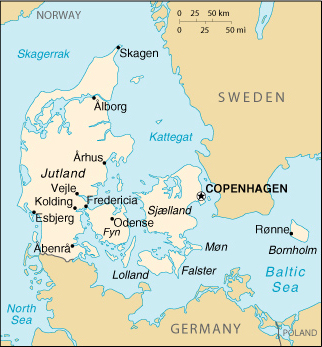
Kongeriget Danmark
(Kingdom of Denmark)
Once a place of Viking raiders and later a major north European power.
Denmark has evolved into a modern, prosperous nation that is participating in the political and economic integration of Europe. So far, however, the country has opted out of some aspects of the European Union's Maastricht Treaty.
In dispute with Iceland over the Faroe Islands' fisheries median line boundary within 200 NM; disputes with Iceland, the UK, and Ireland over the Faroe Islands continental shelf boundary outside 200 NM; Faroese are considering proposals for full independence.
Under the rule of Queen Margrethe II of Denmark (since 14 January 1972). Heir Apparent Crown Prince Frederik, elder son of the monarch (born 26 May 1968). Prime Minister is Anders Fogh Rasmussen (since 27 November 2001).
Capital of Denmark is Copenhagen, and Constitution Day (5 June) is generally viewed as the National Day.

|
Location: Northern Europe, bordering the Baltic Sea and the North Sea, on a peninsula north of Germany (Jutland); also includes two major islands (Sjaeland and Fyn).
Denmark controls the Danish Straits (Skagerrak and Kattegat) linking the Baltic and North Seas.
The area is approximately 43,094 sq km (42,394 sq km land and 700 sq km water). This includes the island of Bornholm in the Baltic Sea and the rest of metropolitan Denmark (the Jutland Peninsula, and the major islands of Sjaeland and Fyn), but excludes the Faroe Islands and Greenland. The terrain is low and flat to gently rolling plains. Natural hazard is flooding, which is a threat in some areas of the country (e.g., parts of Jutland, along the southern coast of the island of Lolland) that are protected from the sea by a system of dikes. Climate consists of cool summers, and mild, windy winters.
Population: About 5,384,384 people live in Denmark, with one-quarter of the population residing in greater Copenhagen (capital city).
The various ethnic groups include Scandinavian, Inuit, Faroese, German, Turkish, Iranian, Somali. Main languages spoken are Danish, Faroese, Greenlandic (an Inuit dialect), German (small minority). English is the predominant second language.
Religious Denomination: Evangelical Lutheran (95%), other Protestant and Roman Catholic (3%), and Muslim (2%).
Agriculture: Products include grain, potatoes, rape, sugar beets; pork and beef, dairy products; fish.
Economy: This thoroughly modern market economy features high-tech agriculture, up-to-date small-scale and corporate industry, extensive government welfare measures, comfortable living standards, and high dependence on foreign trade. Denmark is a net exporter of food and energy. The government has been successful in meeting, and even exceeding, the economic convergence criteria for participating in the third phase (a common European currency) of the European Monetary Union (EMU), but Denmark (in a September 2000 referendum) reconfirmed its decision not to join the 11 other EU members in the euro. Even so, the Danish currency remains pegged to the euro.
Currency: Danish krone (DKK).

